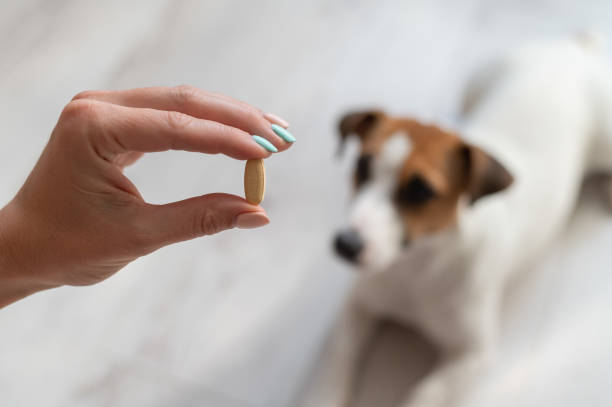
More and more owners will give their dogs fresh food, even if it is not the staple food every day, but maybe they will provide them with a few meals a week so that the dog can supplement nutrition and add vegetables, by the way. However, fresh food makes it difficult to absorb nutrient content in cooked bones. Also, if there is no routine supplement of other ingredients with high calcium content, it may lead to calcium deficiency; iron, zinc, copper, iodine, vitamin E, etc., all come from certain specific ingredients. If the fresh food is not covered for a long time, it is easily deficient.
Thank you for reading this post, don't forget to subscribe!Can Dogs Eat Human Vitamins?
So, can dogs eat human vitamins? The answer depends on what vitamin you feeding your dog. Some human vitamins are good for dogs. They are frequently easier to locate and less expensive than supplements designed expressly for pets. However, not all human supplements are suitable for your pet.
What Vitamin do dogs need?
Vitamins and minerals promote the growth and development of puppies, maintain the health of moms, and assist senior dog’s age with comfort and dignity. Depending on their age, breed, and health situation, your pet’s exact demands can vary and evolve over time.
As a responsible pet owner, you must ensure that your dog consumes an appropriate balance of necessary nutrients. In the same way that a shortfall in vitamin B12 might cause you to feel weak or exhausted, a lack of a vital nutrient can also cause your dog to experience similar symptoms. A vitamin A shortage causes, among other issues, poor vision and motor skills, skin sores, and respiratory difficulties. Long-term deficiency in vitamin B1 could cause your dog to suffer neurological difficulties or cardiac damage.
On the opposite end of the range, excessive amounts of a beneficial substance may also be harmful to dogs. As the result before adding any vitamins or supplements to your dog’s diet, it is essential to check with your veterinarian to make sure your dog’s health.

Vital Dog Supplement.
Vitamins for dogs come in many different forms, such as powders, tablets, capsules, liquids, chews, treats, and even chewy bones. With so many choices, it can be hard to figure out which one is the best.
If you think your dog could benefit from vitamins, the first thing you should do is discuss it with a vet you trust. At the end of the day, the best vitamins for your dog are the ones that meet his or her specific needs, and a professional pet health care provider is the best person to ask about this.
When your dog gets the right vitamins, his body can grow and fix itself. But giving them too many vitamins can hurt their health.
Vitamins help your dog’s body use other nutrients. Without the right balance of vitamins, their body wouldn’t grow or repair itself properly. Feeding a balanced dog food like Pedigree is the easiest way to ensure your dog gets the right amount of vitamins.
Safe Vitamins for Dogs
Your dog needs vitamins from two different groups: vitamins C and B-complex, which dissolve in water, and vitamins A, D, E, and K, which dissolve in fat.
Water-soluble vitamins are the most secure as only trace amounts are retained in the dog’s body.
B-complex vitamins can benefit dogs in a variety of ways, including improved heart, skin, and digestive health.
Vitamin C, niacin, biotin, and folic acid can also be consumed by dogs. For example, Vitamin C is a water-soluble vitamin that stimulates the immune system to fight bacteria and viruses and prevents fat-soluble vitamins’ oxidation (A and E). Dogs can make their vitamin C; when dogs are dying or stressed, their ability to make vitamin C will decline, so they need to be supplemented by diet. Vitamin C plays a vital role in the repair of wounds and fractures, as well as for skin health and more robust blood vessels. However, excessive intake of vitamins can cause gastrointestinal disturbances in dogs, resulting in vomiting, diarrhoea, and other undesirable symptoms (but usually not poisoning).
In addition, excessive use of vitamin C for a long time may lead to stones.
So be sure to ask your veterinarian for advice and evaluate your dog’s condition before supplying your pet with nutritional supplements.
Dogs can benefit from fish oil, which includes omega-3 fatty acids. Gel caps meant for humans, on the other hand, can be hard for dogs to ingest. Remove the tip of a capsule, however, and mix the fish oil into your dog’s usual food dish.
Vitamins to Avoid
Avoid fat-soluble vitamins since any surplus that the body does not require will be stored in fat cells rather than eliminated through the digestive system. This can cause toxicity in some situations. A, D, E, and K are examples of fat-soluble vitamins.
Get vitamins from food

Of course, if the situation allows, it is better to let the dog get the vitamins and nutrients it needs from natural food.
1. Vitamin A: milk tablets, eggs, liver, meat
2. Vitamin b: potatoes, tomatoes, barley, wheat
3. Vitamin C: fruits, liver, vegetables
4, vitamin D: vegetables, meat, milk, eggs
5. Vitamin E: meat, liver
#dog vitamin, dog health, dog supplement, vitamin, dog care
